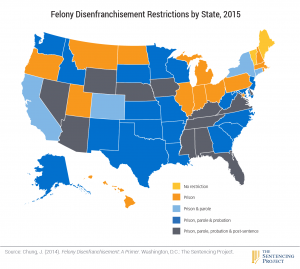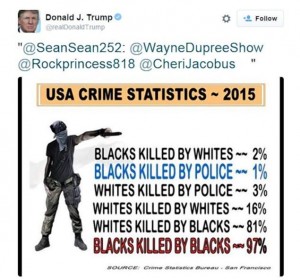BY: SOFIA TARAFA
As Lyndon B. Johnson once observed, “A man without a vote is a man without protection. He is virtually helpless.”[1] Sadly, millions of U.S. citizens are rendered helpless by felon disenfranchisement laws.[2] These laws not only leave those convicted of a felony without a vote, but also deprive the U.S. of a perspective based on a unique set of experiences. If the purpose of a free election is to represent the will of the American people, then felons are a valuable part of that balance. This group represents those who have experienced the criminal justice system from arrest through imprisonment and probation, and thus have an irreplaceable understanding of the realities of crime and punishment.
The issue takes on greater significance in light of the upcoming presidential election. If you doubt the impact the votes of felons could have on the outcome of the 2016 general election, consider the state of Florida. Florida, with its twenty-nine electoral votes[3], is an important win for any presidential hopeful.[4] The state has been split almost 50/50 in each of the last five elections (including the now infamous recount controversy of 2000). In Florida, felons must serve their sentence (including any term of probation), wait up to seven additional years, and only then may they apply to have their rights restored.[7] Waits are long, restoration is not automatic, and, in some cases, hearings are required.[8] The practical effect of these complicated restrictions is often permanent disenfranchisement. Considering the value of a Florida win in the general election, allowing the more than one million disenfranchised felons to vote could potentially determine the next president.

The great differences in disenfranchisement laws state to state call their utility further into question.
The question remains: Why do states deprive felons of their right to vote? According to Florida Governor Rick Scott, the right must be restored only in a “manner that prioritizes public safety and creates incentives to avoid criminal activity.”[9] Both motives are questionable. It is easier to imagine that allowing felons to vote would foster a sense of civic duty, and thus lower rates of recidivism, than to believe it poses a threat to public safety.[10] It is equally unlikely that anyone who is not deterred by the threat of prison would be deterred by the loss of voting rights.
Rob Roper of Vermont, one of only two states where felons can vote even while still imprisoned, provides perhaps more honest insight into the motives behind disenfranchisement.[11] He stated, “It’s really an abomination that felons are allowed to vote. Who are they going to vote for? The people who are going to spend more money on prisons and who are going to let them out early so they can commit more crimes?”[12] This is an obviously improper basis for the removal of rights. Much like a billionaire has a right to cast his vote based on a candidate’s tax plan alone, a felon should have the right to vote based on issues that matter most to him.
Many suspect—and it is easy to understand why—that disenfranchisement laws are actually motivated by racial animus. Nationwide, 7.7 percent of black adults are disenfranchised, compared to 1.8 percent of non-African Americans. [13] Assuming that felons might vote on issues related to crime and race, there are enormous differences of opinion between our 2016 hopefuls. Both Bernie Sanders and Hillary Clinton have acknowledged the racial inequality that plagues our criminal justice system and have voiced their desire to address these issues. Clinton recently wrote, “We have to come to terms with some hard truths about race and justice in America.”[14] Sanders has a long history of fighting racial inequality stemming from his participation in civil rights protests in his youth.[15]
On the other end of the spectrum, we find Republican hopeful Donald Trump. Trump recently tweeted about the percentages of murders committed by whites and blacks—the tweeted image claims that whites and blacks are both killed mostly by blacks.[16] That this was shared by a presidential hopeful is chilling. The numbers are wholly inaccurate, and, sadly, statistics like this one are too often used to dehumanize and blame black men rather than focus on constructive solutions to cycles of crime in underprivileged communities. All the more sinister is that Trump defended the tweet by saying that he merely retweeted and could not be expected to fact-check every statistic.[17] The error may appear small, but it serves to show the candidate’s deep indifference towards racial inequality in criminal justice. To one who has suffered through the realities of a broken system, the gap between these potential candidates is enormous.
At this point, it is clear that the more than 5 million Americans disenfranchised nationwide will be left without remedy in the 2016 presidential election. However, there have been recent positive changes in laws in states like Maryland, which recently restored voting rights to those felons who are no longer imprisoned.[18] Changes like these offer hope that, by the 2020 presidential election, being convicted of a crime won’t mean the deprivation of a basic right of citizenship.
[1] Randall B. Woods, LBJ: Architect of American Ambition, 330 (Simon and Schuster, 2007) (quoting then-Senator Lyndon B. Johnson).
[2] Jean Chung, Felony Disenfranchisement: A Primer, The Sentencing Project, 1 (August 2015), http://sentencingproject.org/doc/publications/fd_Felony%20Disenfranchisement%20Primer.pdf.
[3] Distribution of Electoral Votes, U.S. National Archives and Records Administration, https://www.archives.gov/federal-register/electoral-college/allocation.html. (last visited Feb. 25, 2016).
[4] See Historical Election Results, U.S. National Archives and Records Administration, http://www.archives.gov/federal-register/electoral-college/historical.html. (last visited Feb. 25, 2016) (showing that Florida has voted with the winner in nine out of the last ten elections).
[5] Florida, http://www.270towin.com/states/Florida (last visited Feb. 25, 2016).
[6] Jeff Manza, Sarah Shannon, Christopher Ugga, State-Level Estimates of Felon Disenfranchisement in the United States, 2010, The Sentencing Project (July 2012), http://sentencingproject.org/doc/publications/fd_State_Level_Estimates_of_Felon_Disen_2010.pdf.
[7] Clemency Press Release from Governor Scott of Florida (March 9, 2011), http://felonvoting.procon.org/sourcefiles/florida_clemency_press_release.pdf.
[8]Id.
[9] Id.
[10] See Wilson Ring, Vermont, Maine Only States to Let Inmates Vote, http://www.boston.com/news/local/maine/articles/2008/10/22/vermont_maine_only_states_to_let_inmates_vote/ (Oct. 22, 2008) (“[T]he more we can get folks in prison involved in the community in a responsible way, the better their chances of reintroducing them to the civilian world in a responsible way”).
[11]Id.
[12]Id.
[13] Manza, supra note 6.
[14] Hillary Rodham Clinton, Respect by the Law, Respect for the Law, Brennan Center for Justice (Apr. 27, 2015), https://www.brennancenter.org/analysis/respect-law.
[15]See Sam Frizell, The Radical Education of Bernie Sanders, Time (May 26, 2015), http://time.com/3896500/bernie-sanders-vermont-campaign-radical/.
[16] Alfred NG, Fact-Checking Donald Trump’s Questionable ‘USA Crime Statistics’ Tweet Broken Down by Race, New York Daily News (Nov. 23, 2015), http://www.nydailynews.com/news/politics/fact-checking-donald-trump-questionable-statistics-tweet-article-1.2443285.
[17] Cooper Allen, Trump Defends Tweet with Faulty Crime Stats as ‘A Retweet’, USA Today (Nov. 24, 2015), http://onpolitics.usatoday.com/2015/11/24/donald-trump-retweet-oreilly-factor/.
[18] Matt Ford, Restoring Voting Rights for Felons in Maryland, The Atlantic (Feb. 9, 2016), http://www.theatlantic.com/politics/archive/2016/02/maryland-felon-voting/462000/.





Excellent blog!
Very interesting! I had no idea.